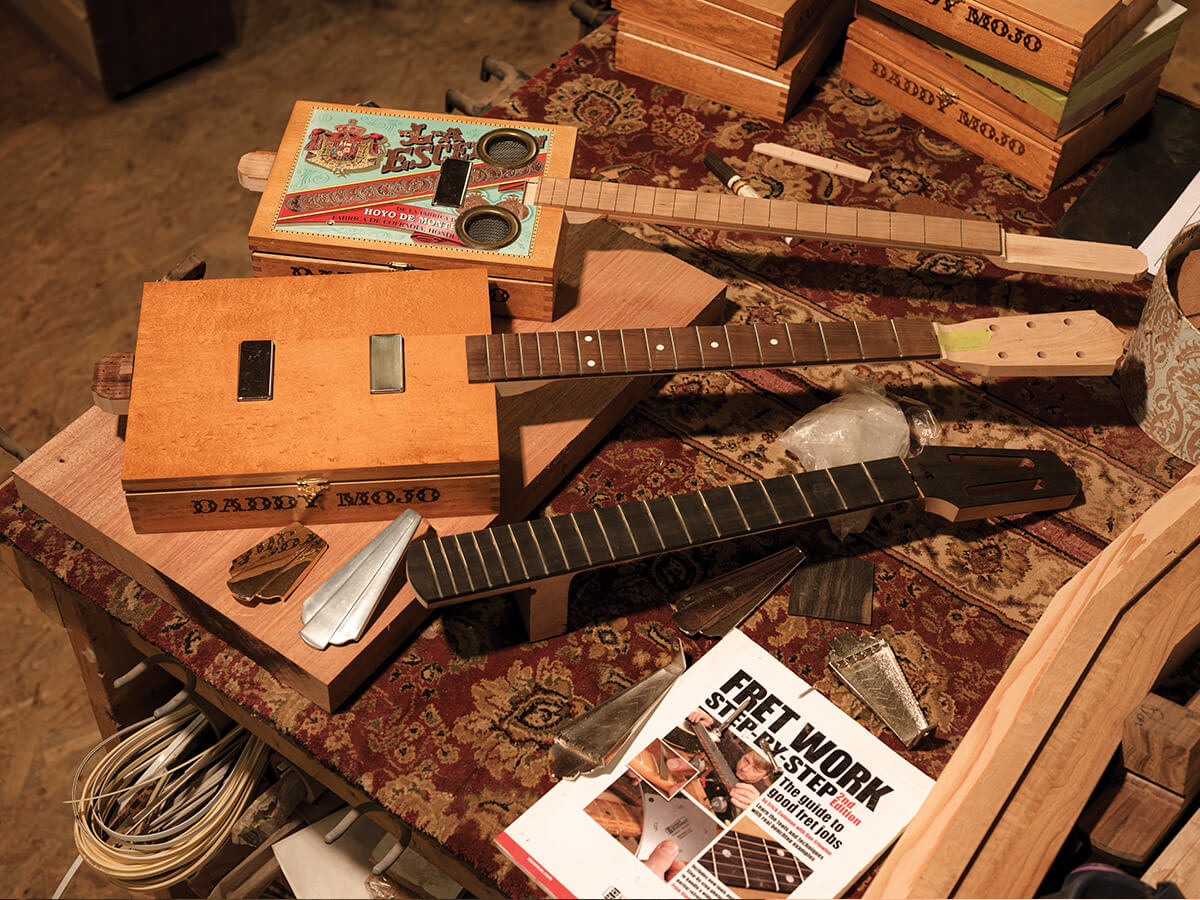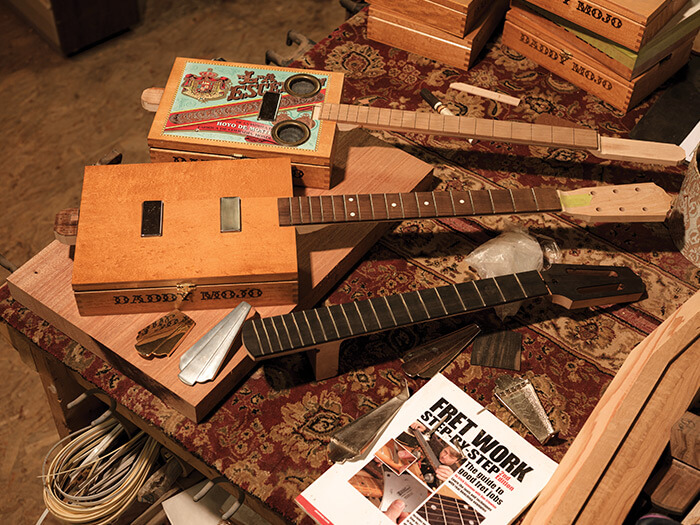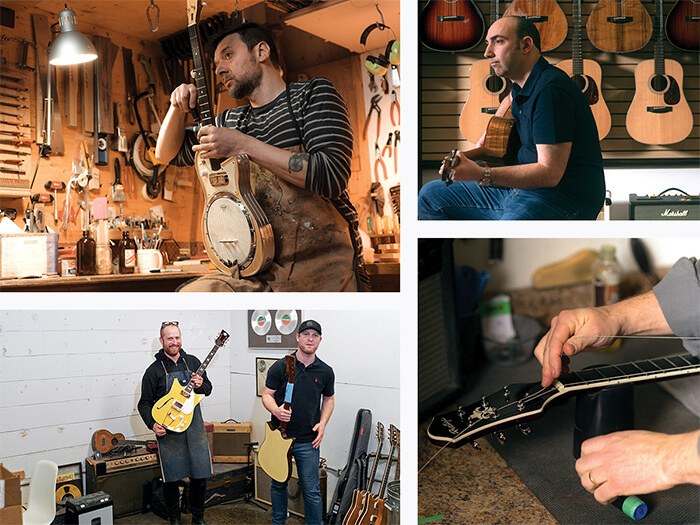
Canada’s guitar-makers are trying to keep up with a sales surge
 Lenny Robert’s cigar-box guitars have been a hit, with a client list that includes musicians like Ronnie Wood and Jack White (Photograph by Alexi Hobbs)
Lenny Robert’s cigar-box guitars have been a hit, with a client list that includes musicians like Ronnie Wood and Jack White (Photograph by Alexi Hobbs)
With so many of us housebound and eager to try new hobbies, or return to those we’ve neglected, it’s no surprise that 2020 was the biggest year for guitar sales on record. Whether it’s novices who finally worked up the nerve to learn the instrument or seasoned players pouncing on any excuse to add to their arsenal, the demand has left guitar manufacturers busier than ever.
North American guitars are internationally renowned as the highest quality on the market, a reputation that has helped Canada’s guitar market grow. Today, Canada boasts a robust community of guitar-makers, with dozens more guitar-builders (referred to as “luthiers”) graduating from luthier schools across the country each year.
“The guitar market in Canada is weird,” says Mike Kurkdjian, founder of Prestige Guitars in Vancouver. “Companies like ours, that are not well-known in our country, tend to be a lot more recognized in the United States and overseas.”
One manufacturer, Quebec-based Godin, dominates the Canadian manufacturing landscape. Godin owns popular brands like Seagull and Simon & Patrick, and operates numerous large-scale production facilities. It produces an estimated 200,000 instruments per year.
There’s a sizable gap between Godin and the rest. The second-largest manufacturer is believed to be Prestige, which has six employees—Kurkdjian included—and produces a relatively modest 3,500 guitars in a given year. It’s notoriously difficult to crack into the Canadian market, where the largest retailer, Long & McQuade, holds distribution deals with major American brands like Gibson and Fender. Stocking its stores with lesser-known homegrown instruments could theoretically jeopardize lucrative distribution deals.
But Canada’s guitar-makers have one notable advantage over the competition: wood.
“A lot of the industry’s woods come from our backyard,” says Kurkdjian, citing several maple species, along with cedar and spruce, all of which are used by the industry’s biggest brands.
Prestige gets the majority of its wood from nearby lumber supply company Bow River Wood to Works. The wood is then dried and stored in Prestige’s wood library, before pre-stencilled billets—or wood sets—are sent to a manufacturing plant in South Korea. There, the instruments are cut to shape, routed and outfitted for the electronic hardware that will be installed once they are returned to Prestige’s workshop, where finishing work, like custom paint work and other installations, is completed. “It allows us to operate at a production level without having to employ the staffing or invest in the heavy machinery and 10,000-square-foot facility that would be required.”
 Images (clockwise from top left): Lenny Robert (Photograph by Alexi Hobbs); Prestige Guitars founder Mike Kurkdjian (Photograph by Jennilee Marigomen); a luthier working on an instrument at Vancouver-based Prestige Guitars (Photograph by Jennilee Marigomen); twin brothers Nick, left, and Tim Frank at the Frank Brothers Guitar Company’s Toronto workshop (Photograph by John Cullen)
Images (clockwise from top left): Lenny Robert (Photograph by Alexi Hobbs); Prestige Guitars founder Mike Kurkdjian (Photograph by Jennilee Marigomen); a luthier working on an instrument at Vancouver-based Prestige Guitars (Photograph by Jennilee Marigomen); twin brothers Nick, left, and Tim Frank at the Frank Brothers Guitar Company’s Toronto workshop (Photograph by John Cullen)
Bow River offers both local and exotic woods to luthiers across the country, like Lenny Robert, founder of Montreal’s Daddy Mojo Electrics. Robert uses his fine arts background to craft unique guitars and, among the lines of instruments he produces, has found a niche making guitar bodies from reclaimed cigar boxes. His cigar-box guitars have been a hit, with a client list that includes musicians like Ronnie Wood and Jack White.
But Robert, like all guitar-builders, witnessed a major shift in recent years. In 2017, the Swiss-based Convention on International Trade in Endangered Species of Wild Fauna and Flora (CITES) successfully lobbied to restrict the trade of rosewood in North America—believed to be one of the most illegally traded woods. Often unsustainably sourced from Brazil, rosewood is a popular dark wood species used in mass furniture production. It’s also traditionally used to build guitar necks and fingerboards.
“The whole collective consciousness in terms of sourcing woods in a responsible way really synergized when CITES came into effect,” says Robert. The CITES restrictions have pushed luthiers like him to experiment with new materials and techniques. Robert began “cooking” maple necks, which not only dried them out further but also darkened the colour. Lately, he’s even been using paper and resin composites in place of rosewood and ebony altogether.
At Prestige, Kurkdjian didn’t need much in the way of convincing—his company had already been running an initiative with organizations like B.C. Parks in which a tree was planted for each guitar that was made. He’s also swapped Prestige’s rosewood necks, opting for pau ferro, a Bolivian species, the use of which is regulated by the Bolivian government. “It looks like rosewood and feels like rosewood,” he says, “but it’s not rosewood.”
The CITES restrictions were lifted in 2019, but most manufacturers remain committed to the ethical and sustainable sourcing of woods. Toronto’s Frank Brothers Guitar Company, a boutique operation that manufactures up to 100 electric guitars per year—almost all of which are built to order—has sourced woods like mahogany from community forests in southern Mexico.
“We’re not building dining room tables over here, but you still have to find a sustainable supply,” says co-founder Tim Frank, adding that the forests are “run by the community itself, who harvest and replant the trees in a sustainable way.”
Whether or not the guitar-building industry will remain committed to limiting the use of rosewood remains to be seen. But the adoption of new, non-traditional materials clearly isn’t scaring away customers. Canadian string instruments are projected to generate roughly $88 million in revenue in 2021 and are projected to grow annually by 5.8 per cent between 2021-2025.
TRENDSPOTTING
Learn why the sales of binoculars are suddenly skyrocketing and how old-fashioned pastimes and non-electronic games are making a major comeback during the pandemic.